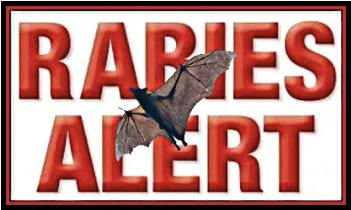 The Nodaway County Health Department has been notified of a bat from Ravenwood that tested positive for rabies.
The Nodaway County Health Department has been notified of a bat from Ravenwood that tested positive for rabies.
The department asks residents to use caution and follow some simple advice regarding bats and potential exposure to rabies:
• Never touch a bat. Although most bats are healthy and do not pose a threat, it’s important to avoid contact with live and dead bats.
• Avoid contact with wild animals and stray pets.
• Make sure dogs and cats are vaccinated against rabies.
• Do not keep wild animals as pets.
• Seek immediate medical evaluation when bitten or otherwise injured by an animal.
Bat exposures are often difficult to determine. If bats are found in the home, especially in areas where individuals are sleeping, especially children, the elderly or those unable to communicate, contact a professional pest control company to remove the bats and submit them for rabies testing. Talk to your doctor about possibly receiving rabies post-exposure vaccine.
Never wait until symptoms of rabies appear. By the time symptoms, fever, headache, weakness, develop, it is too late for treatment. Rabies is a fatal illness. There are currently no tests available to diagnose rabies in people prior to the onset of symptoms.
Keeping bats out of your home is easy by following a few simple steps.
• Do not leave unscreened doors or windows open to the outside. Make sure all doors that open to the outside close tightly.
• Make sure doors and windows are screened, chimneys are capped, and electrical and plumbing openings in the structure are plugged.
• Seal openings larger than ¼ inch by ½ inch square that would allow access into the attic, basement, walls or living areas of a structure.
• Use materials to seal or cover gaps and holes including spray-on expanding foam, wire mesh, netting, caulk, or tight-fitting wood. Steel wool or caulking can be used around pipes that enter buildings.
The department suggests extreme caution in dealing with all animals, especially unfamiliar ones, to reduce the risk of being bitten.
For more information, please contact the department at 660.562.2755 or visit the CDC’s rabies information page at cdc.gov/rabies/ or more specifically cdc.gov/rabies/bats/index.html




Facebook Comments